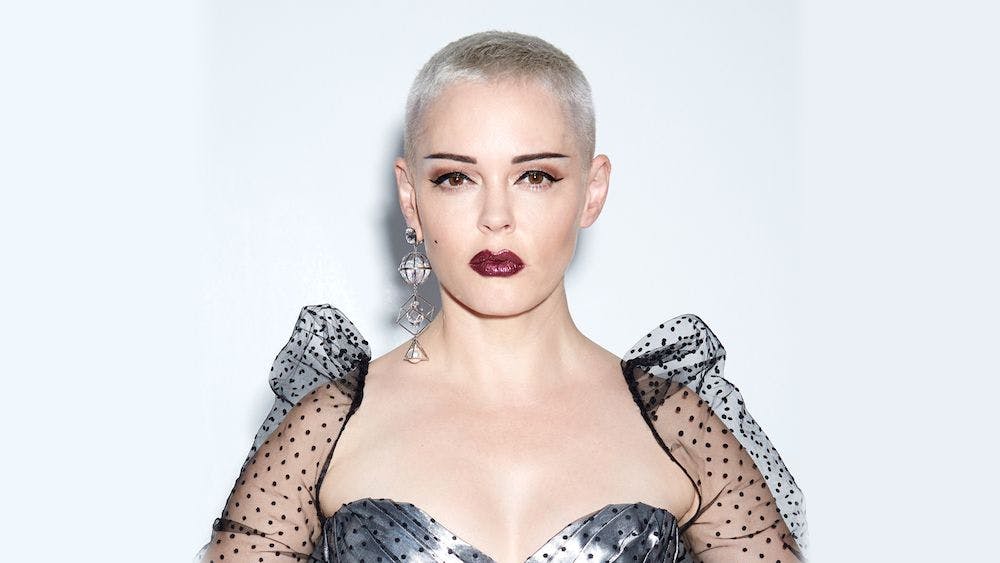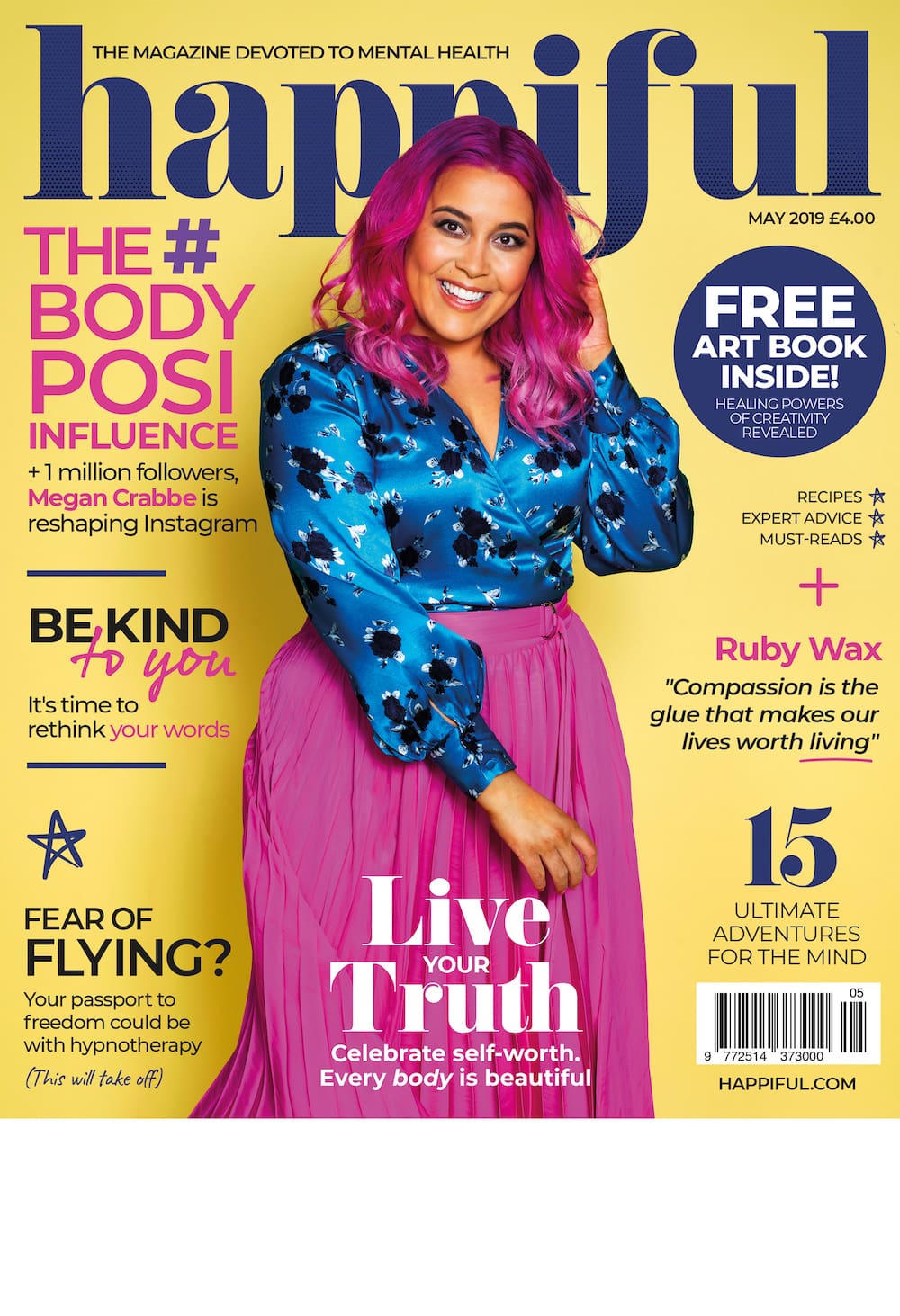Rose McGowan on Redefining Bravery and How We Can All Make a Difference
updated on Apr 26, 2019

Author, artist and unstoppable force for change Rose McGowan speaks to Happiful about what bravery means to her, how we can all make a positive difference, and what the future holds
Rose McGowan has been brave since she was a child. Her father told her sisters that his nickname for her was ‘brave one’, and she adds, laughing, that her mother later said she’s always been ‘thorny’ too, so Rose was a perfect name for her. But, as we discuss, the rose is also a symbol of strength, beauty and protection, and couldn’t be more appropriate...
Many people will recognise Rose for her acting and work as part of the #MeToo movement, but she found real bravery a long time before that. Her aptly-titled book, Brave, explores her childhood in Italy, living in the Children of God cult, moving to America in her teens, and adulthood. It was released last year, when the media frenzy around widespread sexual harrassment and rape allegations throughout Hollywood was at its height, but the telling of her truth had been coming for some time.
“I’ve always been kind of bold,” Rose explains, when we discuss the concept of bravery. “It’s not driven by ego, it’s driven by fear. I always resented being afraid of things, and so instead of shrinking from them I lean into them.
“I’m scared of heights, so I jumped out of a plane. You tackle your fear head on. It doesn’t make it pleasant or fun – not by any stretch – but it’s a compulsion, and I’m that person.

Rose McGowan
“Everyone has their own definition of what bravery is for them. But it’s definitely getting outside of your comfort zone. Who wants to be comfortable all the time? When difficult situations arise, we can either shrink from them, or lean into them. By doing that, I think we can actually change the world.”
This is the first of many hugely optimistic statements I hear from Rose. She wants the world to be a better place, she wants to challenge systems that oppress and damage humans, and she’s committed to making waves.
Many of the areas in which Rose has worked as a social activist are well known. Out of respect to her, I don’t want to spend this article discussing the person who raped Rose in 1997. In her book, she refers to him simply as ‘the monster’, and a Google search for ‘Hollywood Producer #MeToo’ will lead you to more information, should you need to look.
The same search will also offer up information about the momentum the #MeToo movement gathered in 2017 and 2018, when Rose and many others opened up about the terrible treatment they’d endured at the hands of those with power and money to cover up and tarnish the lives and careers of anybody who spoke out against them.
The concept of being compelled to act is evident once more when Rose discusses speaking out against ‘the monster’, and the network of people who were complicit in their unwillingness to acknowledge or stop his toxic abusive behaviour.
“I was waiting for so long for someone else to rise up and do what I did, but they didn’t come. They didn’t come and I knew,” she explains. “I always knew I was meant to do something more than acting, that never quite sat right with me. I always knew I was going to change the world. And I’m not done yet. Maybe I still haven’t done the big thing I’m meant to do, but I always knew it wasn’t in Hollywood.”
I always knew I was going to change the world. And I'm not done yet.
The subsequent discussions and battles around power abuse haven’t been without personal and mental health consequences for Rose. She describes the act of writing the book as “brutal”, and the media storm that followed had a detrimental impact too.
“It’s really hard doing interview after interview,” Rose offers. “While you know you have to push an agenda forward for social justice, you’re seeing your rapist’s face everywhere, you’re being triggered by stupid, inconsiderate questions, and people thinking that your rape is entertainment.
“That’s a brutally difficult thing to go through. And I wouldn’t wish it on anybody. I feel like I barely survived the last couple of years, but I always knew it was going to be the fight of my life. And I was right. It was.”
Part of Rose’s fight included the release of the book – her truth, in her words. She also worked with E! on a four-part documentary, Citizen Rose. Rose was immensely proud of the first part.
“I had control of the edit and worked really hard. It had my music and art in, and it was unique and beautiful. The other episodes I didn’t watch, because it was almost happening in real time. And it was literally too painful.
“It was filmed at a very traumatic period of my life, and I couldn’t relive what was happening, literally the week or two before – it was too much for my brain. But I’m very proud of what I did. I wanted to show truth, and I wanted to show how hard it was to fight.”
'Brave' by Rose McGowan (Harper Collins, £9.99)
One particular moment that stood out for me was when Rose was being photographed at a bookstore. She stands alone against the backdrop as a sea of flashes go off, the photographers hustling and shouting her name.
Rose steps forward, and asserts that she will do the shoot but they need to cease the aggressive yelling. They do. The shoot continues in silence. She thanks them and walks away. Someone later mentions how well she controlled the photographers, but Rose insists it wasn’t about control – she simply reframed the situation.
This example demonstrates her desire to question everything we accept as the norm in society, and her optimism around “being better”. It’s part of this quest for a better society that saw her create the hastag #RoseArmy, not in reference to her name, but after a moment of inspiration walking around the city.
“I saw this bent flower, this bent rose, growing through the cracks in the sidewalk. I was staring at it and I thought, that’s like most of us – we are bent but not broken. A lot of times it feels like we’re going to snap, but we come back up. That’s human nature, and the fight that comes with just being alive, and wanting to stay alive.
“Rose Army is a hashtag with the ethos of: ‘Can we be better? Can we think differently and do you think differently? Let’s connect!’ It’s this hashtag used all over the world, like a handshake.”
To read more of Rose's exclusive chat with us, pick up the May issue of Happiful in supermarkets from Thursday 18 April.

3 Ways to Get Happiful Magazine
Happiful shop: Can't see your copy of Happiful in a store near you? Head to our online shop.
In-store: Pick up your copy in Waitrose, Tesco, Morrisons, WH Smiths Travel, Asda or selected newsagents. Find a store near you.
Online: Happiful is completely free to read digitally. To get our May issue in your inbox this Thursday, subscribe now.


